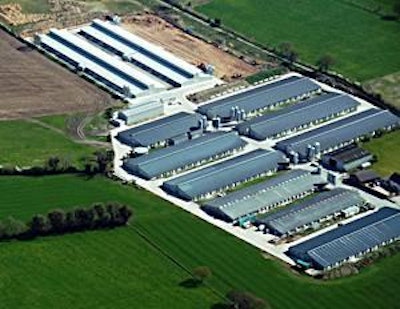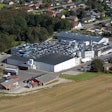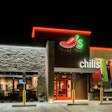
It is far too easy to rein in investment when times are hard, but more often than not, those businesses that keep looking to the future and keep investing are those that achieve long-term success. One of the UK’s largest broiler producers falls firmly into this latter camp.
Alan Simpson took over Lower Heath Farm, in Whitchurch, Shropshire, back in 1967. The business was started producing point-of-lay pullets in two sheds with two employees. It now produces some 470,000 broilers on a seven-crop cycle.
The switch to broiler production occurred in 1979, explains Alan Simpson’s 33-year-old son Charles, who now runs the farm. A downturn in the egg market led to the family switching to broiler production with 50,000 birds per crop, and the business has grown from strength to strength since then with capacity expansions every few years.
Lower Heath Farm supplies birds to Moy Park’s Ashbourne processing site, which was itself expanded by 25% last year. Moy Park supplies the farm with feed. The relationship works well, but in most other aspects, the site is largely self-sufficient.
Charles explains: “There are three staff on site now and we do as much as we can ourselves. We do all our repairs and cleaning out, although power washers are brought in to wash down the houses.”
Investment
The farm has recently invested GBP1.5 million (US$2.4 million) in new facilities and houses, but ground work, including under-floor heating and piping, was carried out in house. The farm team has also recently designed and installed a preconditioning air heater, which is thought to be unique in the UK.
Last year’s investment saw the construction of houses 10 to 13, incorporating the under-floor heating and the precondition air chamber. A new shavings store and farm office were also built. This brought the site’s capacity to 470,000 birds.
The new sheds allow air to be preheated before entry, giving chickens summer conditions all year round. With warm, dry air entering the shed, litter conditions are improved, which in turn gives the customer cleaner, higher quality birds. Coupled with under-floor heating, this results in the highest possible environmental standards.
But the investment did not stop there. The Simpsons also worked with Hydor on the four new sheds, installing 13 Rotem Platinum controllers and the Rotem communicator, along with all ventilation, lighting and motors. By using the communicator, Charles can dial in at any time to check the conditions of the sheds from anywhere. Additionally, the system sends a text message should any alarms be activated, allowing speedy intervention if needed.
While the Simpsons had planned to put in a large solar plant, this has been put on hold due to changes in government support. However, more investments are planned; including the demolition of a couple of old wooden sheds and their replacement with single span buildings, as well as the erection of an additional 400-square-foot building. This will take the farm’s capacity to some 540,000 birds.
The Simpsons have always maintained good relations with neighbours, and no issues arose over the development. Neither was planning consent would be difficult to achieve. However, Charles describes achieving the Integrated Pollution Prevention and Control report as a “nightmare,” and the development became touch-and-go for a while.
Birds and welfare
The farm rears Ross 308 birds. Charles says, “Although we’ve noticed that at about three and a half weeks they can be a bit finicky, they have always performed well."
Some 30% of birds leave the farm at 34 to 35 days, with the remainder moved to Ashbourne at 38 to 39 days. The split is due simply to Moy Park's requirements.
Bird welfare is key to the production process. The new sheds have windows, and plans are being considered to upgrade the remaining houses. Some birds are reared for a particular supermarket chain and these have access to perches, bails and CDs.
Charles firmly believes that higher welfare is the way that the UK industry must go, not only to respond to growing consumer demand, but also as a way of differentiating from overseas competition.
“Overseas producers may have lower costs, but they do not rear to the standards that producers in the UK rear their birds,” he says. He also believes that supermarket chains could do more to support UK producers who are adhering to higher standards.
Dedication
It is not only bird welfare that is central to the family’s ethos; minimizing environmental impact and working with the community are also key.
The farm is helping in the provision of broadband Internet to a local school and over the last five years, the Simpsons have planted some 100 trees and mixed hedging in order to shelter the public from viewing the full extent of the farm and to attract wildlife. There is also a relationship with local farmers whereby litter is collected and used as fertilizer. The site also has oversized tanks sunk into the ground to enable all wash water to be collected and not pollute local water sources.
Following construction of the two most recent houses, landscaping and tidying up are the next projects on the family’s agenda.
But the question remains: Why invest when so many companies are experiencing difficulties and competition is so stiff?
Charles says: “Moy Park always wants more chicken, and the market is ticking along quite nicely. Chicken is cheap and households will always buy it. We’ve not really been hit by the downturn, and for those that want to expand, money is cheap to borrow. We can put up our sheds and get a return very quickly.”
Despite the family’s strong business sense, it does not all come down to money.
"Chickens is what we know and enjoy, and so it makes sense to grow what we know. Why venture into something else?”


















